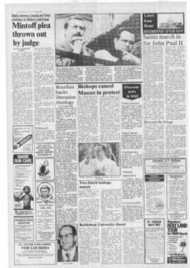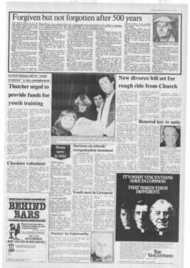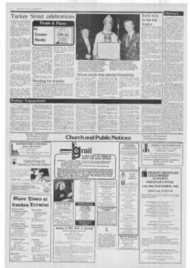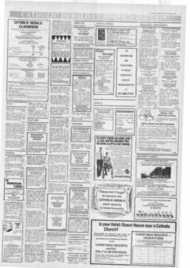Page 1, 11th November 1983
Page 1

Report an error
Noticed an error on this page?If you've noticed an error in this article please click here to report it.
Tags
Share
Related articles
Pope Joins Lutherans In Unity Prayer
Forgiven But Not Forgotten After 500 Years
New Look At Luther
Rumours Of War Dominate Church Year
Bishops Blocked Luther U-turn
Pope calls for re-evaluation of works of Luther
by Desmond O'Grady in Rome POPE JOHN PAUL made an unprecedented gesture of reconciliation with the Lutheran Church on Saturday when he released a letter calling for a reevaluation of Martin Luther and praised the instigator of the Protestant reformation for his "profound religiousness."
In a key paragraph of the letter, the Pope recognised that the faults that caused the breaking of unity should be acknowledged, on whichever side they lay.
"Clearly the rupture of ecclesiastical unity cannot be reduced to the lack of comprehension by Catholic Church authorities or solely to Luther's lack of understanding of true Catholicism," the letter said, "even if both factors played a role."
The papal letter, the first since the Bull against Luther in 1521, does not abrogate the excommunication or rehabilitate the German monk, but it endorses recent Catholic studies which reconsider Luther's role.
It was sent in German to Cardinal Jan Willicbrands, President of the Secretariat for Christian Unity, who represented the Holy See at the fifth centenary celebrations for Luther's birth on November 10, 1483, in Germany.
The Pope will also be attending a Lutheran service in Rome in a months time, on December 11, at which he is expected to give the sermon.
"For the Catholic Church the name of Martin Luther has through the centuries been tied to a painful period in history, in particular the experience of profound ecclesiastical divisions," he said.
Scholars, said the Pope, have shown the "profound religiosity of Luther" who, with burning passion, was engaged by questions of eternal salvation.
The Pope stated that the recomposition of ecclesial unity will not be produced simply by historical research but required "faith dialogue". "Only by purifying ourselves through truth" stated the letter, "can we find a shared interpretation of the past and at the same time reach a new point of departure for dialogue today."
Pope John Paul's implicit recognition of the Church's partial responsibility for the breaking of unity is commonplace in recent Catholic scholarship, but now has the weight of his office behind it.
At the Fifth Lutheran World Federation Meeting at Evian in July 1970 Cardinal Willebrands called Luther "our common master". That same year an assembly of German Catholics asked for the cancellation of excommunication of Luther but it was declined by Pope Paul VI.
The papal letter said: "November 10, 1983 is the 500th anniversary of the birth of Dr Martin Luther of Eislcben. On this occasion numerous Christians, especially of the Lutheran-Evangelical confession, recall that theologian who, at the threshold of modern times, contributed in a substantial way to the radical change of ecclesiastical and
secular reality of the West.
"Our world today still bears the experience of his great impact on history.
"For the Catholic Church through the centuries the name of Martin Luther is tied to the memory of a sad period and, in particular, to the experience of the origin of deep ecclesiastical divisions.
"For this reason the 500th anniversary of the birth of Martin Luther must be for us an occasion to meditate, in truth and in Christian charity, on that pregnant event of history that was the epoch of the Reformation."
The letter continued:
"Scientific research by Evangelical and Catholic scholars, the results of which have already reached notable points of convergence, has led to the outlining of a more complete and more differentiated picture of Luther's personality, of the complex web of historical reality in society, in politics and the Church of the first half of the 16th century."
The letter concluded: "In the first place it is important to continue accurate historical work. It is a question of, through an investigation without taking sides, motivated only by the search for truth, arriving at a just image of the reformer, of the entire epoch of the reformation and of the people who were involved in it.
"Guilt, where it exists, must be recognised, on whichever side it is found. Where polemics have clouded the view, the direction of this view must be corrected and independently by one side or the other."
The small Protestant minority in Italy have welcomed the letter, but pointed to what they see as its shortcomings.
Professor Bruno Corsani, who teaches in Rome, said he saw a "Certain contradiction between a document such as this and other statements, and above all acts of authority by the Catholic Church."
blog comments powered by Disqus











